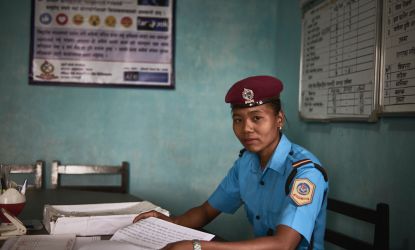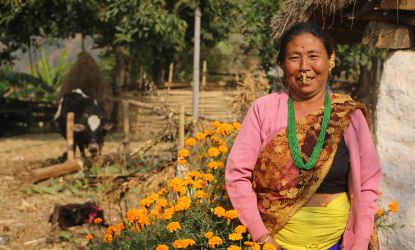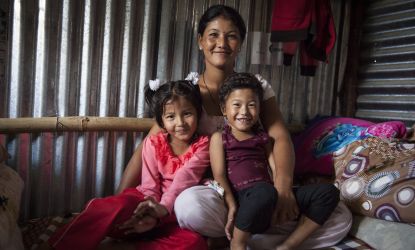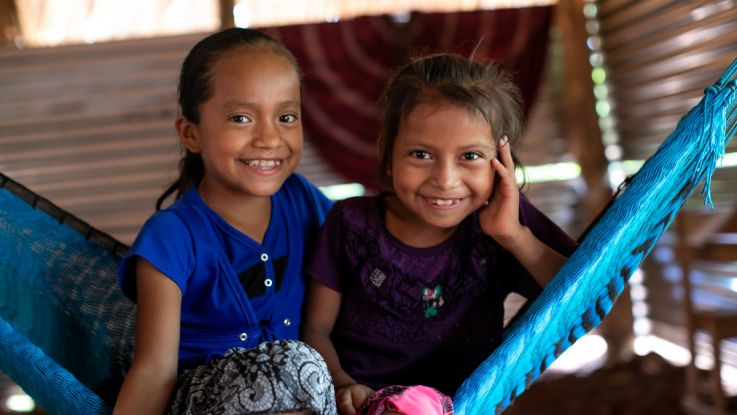Nepal
Why we work in Nepal
Nepal is one of the world’s youngest democracies. A quarter of the population live on less than $1.25 a day, and recent conflict and disasters have made it especially hard for communities to lift themselves out of poverty.
Nepal was already struggling to overcome the effects of a decade-long civil war when two earthquakes struck the country in April 2015. More than 9,000 people died and 23,000 were injured. Almost a third of the population were affected.
Nepal is also one of the most vulnerable countries in the world to climate change.4 Erratic rainfall, floods and droughts are becoming more common and more severe, putting lives at risk, endangering agricultural livelihoods and threatening food security. In September 2024 heavy rainfall and the resulting floods caused the deaths of nearly 250 people, including 55 children. More than 80,000 people were affected, with the floods destroying homes, schools, water supply systems and health facilities.
Women’s rights in Nepal
Despite progress in recent years, women still face significant inequality in Nepal.
Just 45% of adult women are literate, compared with 72% of men,5 and girls commonly drop out of school due to the burden of household chores.
36% of women and girls have never attended school - twice as many as men and boys.6
Largely rural, Nepal has a tradition of migration for work, but it also has a serious trafficking problem. As many as 15,000 young women are taken every year to work in brothels in India.7

Children's clubs in Nepal are supporting girls to stay in school .
What we do in Nepal
Ending period poverty and period shaming
In parts of Western Nepal, women and girls are often sent away from their homes during their periods because it is believed that they will bring bad luck.
They are forced to live in remote huts, away from their family and friends. This practice is called “chhaupadi” and although it has been illegal in Nepal since 2005, it is still practised in many communities.
ActionAid collaborates with local women’s groups in Western Nepal to raise awareness about the negative effects of chhaupadi and its illegal status. By working with community and religious leaders, as well as local police, we’re helping to bring an end to chhaupadi.
We also work to teach young girls about menstrual hygiene, and run trainings so women and girls learn how to make safe, reusable sanitary pads.
When girls have access to menstrual products, and can use them safely, they are more likely to stay in school and get the education they deserve.
Supporting women’s economic empowerment and ending violence
Research shows at least one in five women in Nepal have experienced gender-based violence,8 but more than two-thirds of those have not sought help, pointing to a lack of awareness about women's rights and/or a lack of sufficient help available.9
That's why ActionAid supports Reflect Circles across Nepal - local women's groups providing training, safe places to discuss women's issues and learn about their rights.
Reflect Circles also help women develop skills so they can become economically independent, particularly in climate-resilient agricultural methods.
They are also an opportunity to share resources, through community seed banks, which allows entire communities to benefit.
Disasters in Nepal
Nepal earthquakes in 2015
In April and May 2015 two devastating earthquakes struck Nepal, killing 9,000 people and leaving hundreds of thousands of survivors homeless.
ActionAid reached at least 150,000 people in the aftermath, with a range of support: from tools to rebuild homes, to business skills training to help people rebuild their livelihoods.
When disasters strike, women and girls are often the hardest-hit, so we put the rights of women and girls at the heart of our approach.
- We established 16 permanent women-friendly spaces to support women and girls and help them rebuild their lives.
- We distributed over 7,000 dignity kits, containing essentials like sanitary pads and underwear, so women could manage their periods safely, and with dignity.
- We established Children's Clubs - safe places for children to play, recover from their trauma, and continue to learn.

Ending harmful period-shaming practices
23-year-old Rajkumari is a police constable in the Doti district in Nepal. She works alongside ActionAid to end the harmful period-shaming practice of chhaupadi.
The practice involves banishing girls to isolated huts while they're menstruating.
Rajkumari works with the local community to teach people about the risks and negative impacts of chhaupadi, over the radio and through school programmes.
With the help of local leaders and policewoman like her, we have seen more than 1,400 women of reproductive age stop practising chhaupadi in the past 10 years. Rajkumari said:
Previously, girls were not allowed to go to school during menstruation. But now, they are going to school. Previously there were no facilities offering girls the sanitary pad, but now the school is distributing sanitary pads for girls.
Rajkumari works with ActionAid to end Chhaupadi in Nepal
Poulomi Basu/ActionAid

Supporting healthy, sustainable food production
Agriculture is Nepal’s principal economic activity, but the use of expensive chemical fertilisers was making it difficult for farmers to yield crops sustainably.
ActionAid has established Reflect Circles in rural communities, where farmers learn about organic farming methods, increasing long-term productivity and providing health benefits.
56-year-old Mana Maya, a farmer, said: "I joined the Reflect circle formed by ActionAid and I also got an opportunity to participate in an organic vegetable farming training. The training has helped us a lot, because now we don’t have to spend money on chemical fertilizers and pesticides.
"I along with 12 other farmers of my village are making good money from the production of organic vegetables.
The increased income has enabled us to live a healthy life and also to save some money each month for our future."
Mana Maya is a member of a Reflect Circle in Nepal
Santosh Tigela/ActionAid

Rama Maharjan with her two daughters Kristina, seven, left, and Krishla, four, inside their temporary shelter
Kishor K. Sharma/ActionAid
Helping families during disasters
Along with three million others, 32-year-old Rama lost her home in the earthquakes in 2015.
Her daughters were playing with their friend in the courtyard when the quake struck, and rubble trapped them.
Luckily Krishla was pulled free, but she was badly injured and traumatised.
ActionAid helped to provide Krishla with urgent medical care, and supported her family with emergency aid, including food.
Rama told us Krishla has now recovered from her injuries.
Learn more about how we respond in emergenciesI am happy that both my daughters have recovered from the trauma."
Footnotes
- 1 https://databankfiles.worldbank.org/public/ddpext_download/poverty/987B9C90-CB9F-4D93-AE8C-750588BF00QA/current/Global_POVEQ_NPL.pdf
- 2 https://data.unwomen.org/country/nepal
- 3 https://www.girlsnotbrides.org/learning-resources/child-marriage-atlas/atlas/nepal
- 4https://www.un.org/development/desa/dpad/wp-content/uploads/sites/45/2019LINK-Tuesday-Session3-E.pdf
- 5https://blogs.worldbank.org/endpovertyinsouthasia/long-road-gender-equality-nepal
- 6https://reliefweb.int/report/nepal/nepal-annual-household-survey-201516
- 7https://www.unodc.org/southasia/frontpage/2009/November/trafficked-women-make-a-difference.html
- 8https://dhsprogram.com/pubs/pdf/SR243/SR243.pdf
- 9https://www.ohchr.org/EN/NewsEvents/Pages/DisplayNews.aspx?NewsID=23955&LangID=E
Page updated 29 January 2025



